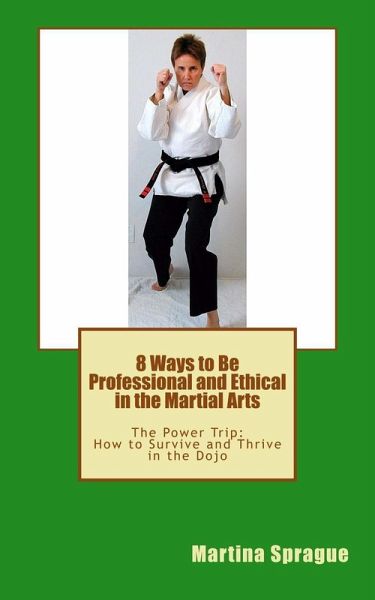
8 Ways to Be Professional and Ethical in the Martial Arts (The Power Trip: How to Survive and Thrive in the Dojo, #2) (eBook, ePUB)

PAYBACK Punkte
0 °P sammeln!
It has been said that forewarned is forearmed. Many students don't know what to expect or how to increase motivation, retention, and rate of learning when first signing up to study the martial arts. You are left in the hands of an instructor who is often a student himself, and not a teacher by profession. The Power Trip: How to Survive and Thrive in the Dojo is an informative and critical series of books that will give you the power to thrive in an environment where other students and even instructors at times sit on their "high horses," arguing over "best techniques" or making snide remarks a...
It has been said that forewarned is forearmed. Many students don't know what to expect or how to increase motivation, retention, and rate of learning when first signing up to study the martial arts. You are left in the hands of an instructor who is often a student himself, and not a teacher by profession. The Power Trip: How to Survive and Thrive in the Dojo is an informative and critical series of books that will give you the power to thrive in an environment where other students and even instructors at times sit on their "high horses," arguing over "best techniques" or making snide remarks about your performance. It will also arm you for the day you will begin teaching the martial arts (or help you improve your technique if you are already teaching), and show you how to build your integrity and repute as an instructor.
If you are a new student in the martial arts, ready to sign up for your first lesson, you will gain a lot of information about the difficulties you can expect to encounter sometime throughout your training, and explore options for resolving potential conflicts. If you are a seasoned martial artist with years under your belt, you will no doubt recognize many of the scenarios presented, and be able to look back at your journey and consider what you could have done differently. Since the advice is not style specific but explores a multitude of scenarios that frequently play themselves out in the martial arts training hall, it applies to students of most martial styles.
8 Ways to Be Professional and Ethical in the Martial Arts, the second book in the series, defines professionalism and discusses several scenarios relevant to how instructors and other students might behave in situations ranging from representing the martial arts, signing up for lessons, and dealing with sensitive issues such as non-competition clauses in contracts. It also discusses other practical matters such as how to further one's education through the use of a number of educational tools. The material in this book is excerpted from the previously published book (now out of print), The Complete Martial Arts Student, also by Martina Sprague.
The full series comprises the following books:
1. 10 Things the Martial Arts Student Must Understand
2. 8 Ways to Be Professional and Ethical in the Martial Arts
3. 8 Methods for Learning the Martial Arts, Setting Goals, and Getting Motivated
4. 6 Ways to Improve Performance and Correct Errors in the Martial Arts
5. 8 Ways to Benefit from Critique and Testing in the Martial Arts
6. 6 Tips for Communicating Effectively and Dealing with Behavioral Problems in the Martial Arts
If you are a new student in the martial arts, ready to sign up for your first lesson, you will gain a lot of information about the difficulties you can expect to encounter sometime throughout your training, and explore options for resolving potential conflicts. If you are a seasoned martial artist with years under your belt, you will no doubt recognize many of the scenarios presented, and be able to look back at your journey and consider what you could have done differently. Since the advice is not style specific but explores a multitude of scenarios that frequently play themselves out in the martial arts training hall, it applies to students of most martial styles.
8 Ways to Be Professional and Ethical in the Martial Arts, the second book in the series, defines professionalism and discusses several scenarios relevant to how instructors and other students might behave in situations ranging from representing the martial arts, signing up for lessons, and dealing with sensitive issues such as non-competition clauses in contracts. It also discusses other practical matters such as how to further one's education through the use of a number of educational tools. The material in this book is excerpted from the previously published book (now out of print), The Complete Martial Arts Student, also by Martina Sprague.
The full series comprises the following books:
1. 10 Things the Martial Arts Student Must Understand
2. 8 Ways to Be Professional and Ethical in the Martial Arts
3. 8 Methods for Learning the Martial Arts, Setting Goals, and Getting Motivated
4. 6 Ways to Improve Performance and Correct Errors in the Martial Arts
5. 8 Ways to Benefit from Critique and Testing in the Martial Arts
6. 6 Tips for Communicating Effectively and Dealing with Behavioral Problems in the Martial Arts
Dieser Download kann aus rechtlichen Gründen nur mit Rechnungsadresse in A, B, CY, CZ, D, DK, EW, E, FIN, F, GR, H, IRL, I, LT, L, LR, M, NL, PL, P, R, S, SLO, SK ausgeliefert werden.



